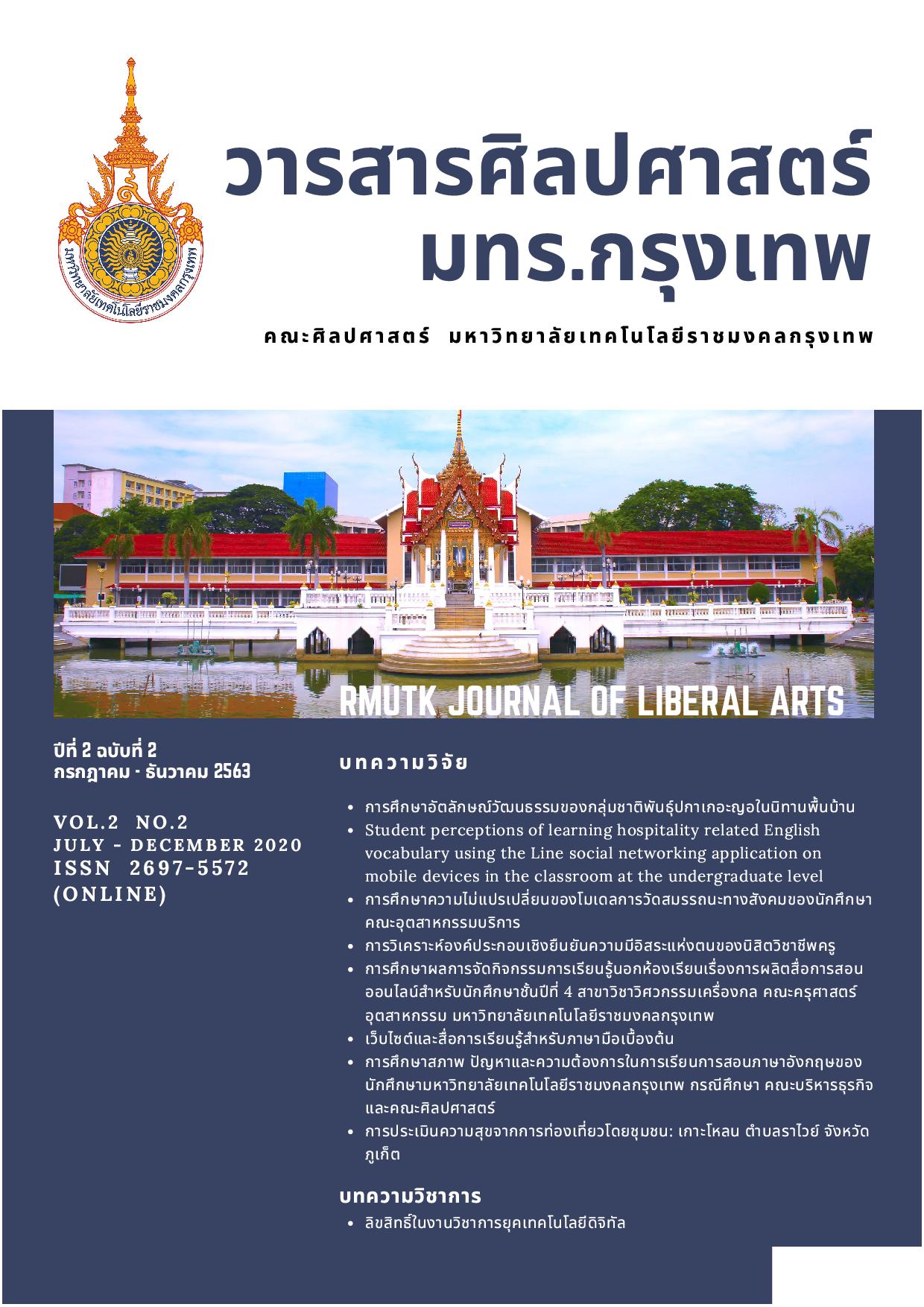THE EVALUATION OF HAPPINESS FROM COMMUNITY BASED TOUTISM: KOH LOHN, RAWAI SUBDISTRICT, PHUKET
Main Article Content
Abstract
The first objective of this study is to evaluate the happiness of the community by local people living in Koh Lohn, Rawai Subdistrict, Phuket, Thailand. And the second objective is to suggest the way to enhance the happiness level of people living in Koh Lohn, Rawai Subdistrict, Phuket, Thailand.
The population of this research were 238 peoples who living in Koh Lon, Rawai Sub-district, Phuket Province. The population could be divided into 3 groups which were people who are directly involved in tourism management, people who are indirectly involved in tourism management, and people who do not participate in tourism management. The researcher used Taro Yamane sample size equation to stipulate the sample size equal to 150 local people and utilized the purposive sampling technique. In this research used questionnaire that asked the opinion of the happiness of community tourism. To analyze the finding, the researcher uses the happiness indicator referable to Gross National Happiness (GNH) indicator. The statistics used in this research is frequency distribution, percentage, mean and standard deviation, t-test and f-test.
The result of this study found that the local people who leave in tourist area have happiness at the highest level. The total of subjective well-being (SWB) and objective well-being (OWB) at the highest level. A comparison results after local people were joined the community-based tourism management found that the local people happiness level rise than formerly.The ways to enhance happiness level of people living in Koh Lohn, Rawai Subdistrict, Phuket, Thailand were proposed, as followed: 1) establishes guidelines and procedure of community-based tourism for local people and local entrepreneur. 2) promote and increase the direct interaction of local people in the community. 3) encourage people in the community to produce and/or enhance local products to become a souvenir for selling to tourists. 4) create the all year round travel schedule to notify the tourists that the community can visit in every season.
Article Details
References
กาหรีม สองเมือง. ประธานกลุ่มวิสาหกิจชุมชนตำบลราไวย์ เกาะโหลน. (1 ตุลาคม 2561). สัมภาษณ์.
ชุติระ ระบอบ และคณะ. (2552). ระเบียบวิธีวิจัย. กรุงเทพฯ: โรงพิมพ์มหาวิทยาลัยธุรกิจบัณฑิตย์.
ธนกฤต ทุริสุทธิ์ และชาตรี นาคะกุล. (2556). ดัชนีวัดความสุขมวลรวมชุมชนตามหลักปรัชญาเศรษฐกิจพอเพียง. วารสารสังคมศาสตร์และมนุษยศาสตร์. 39, 1 : 209-220.
ศิรินันท์ กิตติสุขสถิต และคณะ. (2555). คุณภาพชีวิตการทำงานและความสุข. กรุงเทพฯ: บริษัท อัพทรูยู ครีเอทนิว จำกัด.
สถาบันการท่องเที่ยวโดยชุมชน. (2556). คู่มือมาตรฐานการท่องเที่ยวโดยชุมชน. เชียงใหม่: หจก.วนิดาการพิมพ์.
สินธุ์ สโรบล. (2555). การท่องเที่ยวโดยชุมชน: แนวคิดและประสบการณ์พื้นที่ภาคเหนือ. เชียงใหม่: สำนักงานกองทุนสนับสนุนการวิจัย สำนักงานภาค.
สำนักงานคณะกรรมการพัฒนาการเศรษฐกิจและสังคมแห่งชาติ. (2560). สรุปสาระสำคัญแผนพัฒนาเศรษฐกิจและสังคมแห่งชาติฉบับที่ 12 พ.ศ. 2560-2564. กรุงเทพฯ: สำนักนายกรัฐมนตรี.
Campbell, Angus. (1980). The Sense of Well-Being in America. New York: McGraw-Hill.
Centre for Bhutan Studies. (2010). GNH Index. [Online]. Available: http://www.grossnationalhappiness.com/articles/ (access date 1 November 2016)
Kai Liu. (2013). Happiness and Tourism. [Online]. Available: https://ijbssnet. com/journals/Vol_4_No_15_Special_Issue_November_2013/8.pdf (access date 1 November 2016)
Scott, Mccabe & Sarah, Johnson. (2012). The happiness factor in tourism: subjective well-being and social tourism.U.K. [Online]. Available: http://dx.doi.org/10.1016/jannals.2012.12.001 (access date 27 January 2018)
Taro, Yamane. (1973). Statistics: An Introductory Analysis. New York: Harper and Row Publications.
United Nations World Tourism Organization-UNWTO. 1998. Sustainable Development of Tourism. [Online]. Available: http://sdt.unwto.org/content/about-us-5. (access date 11 November 2018)


